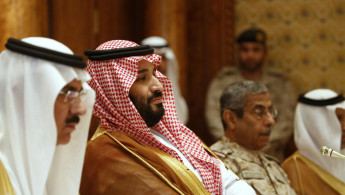'Decade in jail' for criticising Saudi king or crown prince, death penalty for 'terrorists'
Saudi Arabia announced new anti-terror laws on Sunday, which will result in the death penalty for convicted militants and between five and ten years in jail for criticising crown prince.
2 min read
The new laws are seen as a way of cementing Mohammed bin Salman's rule [Getty]
Saudi Arabia unveiled tough new laws against militancy and criticism of the country's leadership on Saturday, before a raft of arrests were made against senior princes and leading businessmen.
Critics of King Salman or Crown Prince Mohammed bin Salman will face between five and ten years in jail under the new laws announced on this weekend.
Anyone caught "misusing" their "social, media or academic" influence to "promote terrorism" will face up to 15 years in prison.
Militants who take part in attacks that lead to deaths will be executed.
The laws came before the shock arrest of dozens of former ministers, princes and businessmen on corruption charges in a clampdown widely seeing as limiting potential rivals to Crown Prince Mohammed bin Salman.
His de-facto leadership of the country has been cemented with the latest purge, which included the arrests of powerful and high-profile figures such as multi-billionaire Prince al-Waleed bin Talal.
A reshuffle of ministers was also made to consolidate Mohammed bin Salman's rule over the country, which has witnessed the mass detention of liberal and Islamist thinkers, writers and clerics in recent months.
Anti-terror laws have been used by Gulf states to arrest government critics and the new powers look set to bolster impact on free speech.
Saudi Arabia has witnessed numerous attacks from al-Qaeda and Islamic State group militants, as well as the restless Shia community in the east.
The new regulations look set to punish those involved in financing terrorism as well as militants.
Jail terms have been fixed for militants carrying guns or explosives during attacks to between 10 and 30 years.
Anyone caught setting up or leading a terror cell will spend between 10 and 25 years behind bars, while individuals who encourage others to join a terrorist organisation will face eight to 25 years in jail.
It also includes punishments of between ten and 30 years for individuals who train in martial arts to use in "terrorist operations".
Former military personnel convicted of terrorism will face more stringent sentences.
Crown Prince Mohammed bin Salman has unveiled reforms and promised to bring Saudi Arabia "back to moderate Islam" in a bid to attract foreign investment to the country.
Although some have welcomed the reforms as essential to the modernisation of the country, others believe the new laws aimed at repression of the rulers' critics.
Critics of King Salman or Crown Prince Mohammed bin Salman will face between five and ten years in jail under the new laws announced on this weekend.
Anyone caught "misusing" their "social, media or academic" influence to "promote terrorism" will face up to 15 years in prison.
Militants who take part in attacks that lead to deaths will be executed.
The laws came before the shock arrest of dozens of former ministers, princes and businessmen on corruption charges in a clampdown widely seeing as limiting potential rivals to Crown Prince Mohammed bin Salman.
His de-facto leadership of the country has been cemented with the latest purge, which included the arrests of powerful and high-profile figures such as multi-billionaire Prince al-Waleed bin Talal.
A reshuffle of ministers was also made to consolidate Mohammed bin Salman's rule over the country, which has witnessed the mass detention of liberal and Islamist thinkers, writers and clerics in recent months.
Anti-terror laws have been used by Gulf states to arrest government critics and the new powers look set to bolster impact on free speech.
Saudi Arabia has witnessed numerous attacks from al-Qaeda and Islamic State group militants, as well as the restless Shia community in the east.
The new regulations look set to punish those involved in financing terrorism as well as militants.
Jail terms have been fixed for militants carrying guns or explosives during attacks to between 10 and 30 years.
Anyone caught setting up or leading a terror cell will spend between 10 and 25 years behind bars, while individuals who encourage others to join a terrorist organisation will face eight to 25 years in jail.
It also includes punishments of between ten and 30 years for individuals who train in martial arts to use in "terrorist operations".
Former military personnel convicted of terrorism will face more stringent sentences.
Crown Prince Mohammed bin Salman has unveiled reforms and promised to bring Saudi Arabia "back to moderate Islam" in a bid to attract foreign investment to the country.
Although some have welcomed the reforms as essential to the modernisation of the country, others believe the new laws aimed at repression of the rulers' critics.





 Follow the Middle East's top stories in English at The New Arab on Google News
Follow the Middle East's top stories in English at The New Arab on Google News
![Israeli forces ordered bombed Gaza's Jabalia, ordering residents to leave [Getty]](/sites/default/files/styles/image_330x185/public/2176418030.jpeg?h=a5f2f23a&itok=_YGZaP1z)

